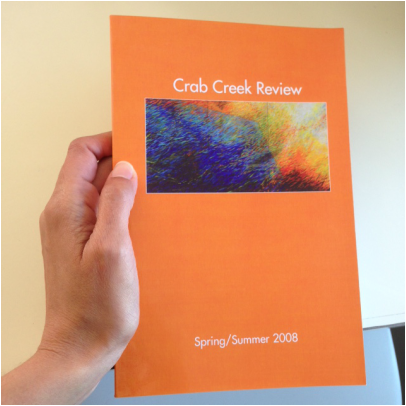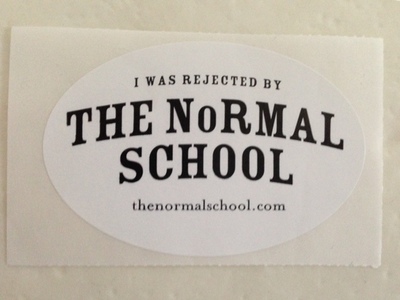 There’s the bit about taste being subjective. What a writer can get away with has just as much to do with editorial leanings as skill. While I’m not completely opposed to someone cursing in his work (how could I when I’ve occasionally done the same?), it better serve some purpose. Often, it just seems lazy. The same could be said for using a word that is inherently charged. Some enjoy playing with that—if I say the same word over and over again will it lose its meaning or will it incite an uproar? Will the dialogue that ensues persist longer than the poem would on its own if not for a particular word choice (insert inflammatory word here). And if so, is it working? I guess it depends on your goal and/or whether you are aware of your motives. Did your submission with five poems about horses arrive on the day when the next issue was already stacked heavily with horse poems (a scenario that actually happened at a journal where I was volunteering). You were rejected because we weren’t committed to making it an equestrian theme—a decision that had nothing to do with the quality of your writing. Maybe this makes you angry. You think, “Well, if my poem was good enough to be published they should have placed it in another issue. It’s not my fault that it arrived when it did.” And I guess that’s one way of looking at it, but then there’s the reality behind the scenes of editing a small literary magazine. Though it has been nearly seven years since I handed over the reins of Crab Creek Review, I’m going to maintain that the act of small mag publishing is still very much a labor. While I initially came onto CCR as an editorial assistant, I knew nothing about publishing—what I understood was the other side, being published. I can still remember that feeling of exhilaration as I left my second official meeting with a couple of packets of manila envelopes rubber-banded in place—those poetry submissions filled with potential genius. How fun to sit on the ferry and flip through the cover letters, the 3-5 poems/submission (when they were following the guides)—to know that somewhere in these stacks I’d find someone I’d never heard of that would just send me. A couple of months later, when the three main editors decided it was time for them to part and to either put the journal down or hand it over to another editorial assistant and me, I initially declined. At the time, I was working 4-6 part-time jobs depending on the week, I was starting my massage practice and a new relationship, as well as generating what would later become The Cardiologist’s Daughter, another (yet unpublished) full-length poetry collection, while writing book reviews, some occasional essays and fiction pieces. I was, I guess, more than a bit busy. I can still remember discussing this proposal with my dad (who happened to be in town for a Cardio CT workshop) over a piece of the most divine tiramisu, the gist of which was I pretty much had to say “Yes”. I remember worrying about where the money was going to come from, my Pops reassuring me that it would. After the next issue was going to print, we would be essentially tapped out—but there was a grant that the last editor’s had yet to fulfill and there were loyal readers/patrons and then there was the volunteer crew (Andrea Rae, Lana Hechtman Ayers, Tonya Namura, Kerry Banazek, and Carol Levin) that assembled from out of the ether. There were poetry friends such as Jeannine Hall Gailey who acted as a consultant. There was all this collective intelligence, experience, and drive that informed and supported me as I took over a non-profit literary organization, the back-log of hundreds of submissions (which I initially read alone before this crew assembled, all the while maintaining my before-mentioned jobs). Also, other local editors such as Amber Curtis (who conceived of and published Cranky—which I call my first real literary publication) met with me to discuss their system for managing submissions, tips on how to move forward with a small journal in Seattle. And, of course, the old editors gave me the small details of how they had handled everything from the financials to well—anything I needed to know. Pretty much everyone’s husband/sig-fig was involved on some level whether it be through volunteering to help create a data-base or restructuring the website or going golfing with another one while we met and tried to figure out how to proceed with/without distribution, whether we would change the design/font and/or logo, or how to bring the journal back into the black. These were just a few of the things that were going on aside from the consideration of submissions. There were times when I vehemently disagreed about an editor’s choice of a poem or story and decided, as Editor-in-Chief, that I couldn’t get behind its publication. There were also times when I allowed for the opposite, because I understood that the editor felt strongly about a piece and maybe it was in the best interest of the journal to allow it to go to print. There are stories I deeply regret not lobbying for by writers who have since gone on to demonstrate more and more beauty in their collections. Conversely, there are the poems/stories that I wish we never printed. This is the reality of publishing—especially a small literary journal. We were all committed to the journal as an entity, to the publication of excellent work, but what was excellent exactly? We could have, and probably did, spend hours alone on this question. And there is so much more to consider when questioning, “Why did I get rejected from such and such a journal?” Much of it you may never understand, but I’ll follow through with some more specifics in future posts. For now, know that it might have been something as simple as theme or some bias perhaps even unknown to the reader herself. And we’d like to all believe that we’re above this sort of thing, but we all have bias. Some editors just aren’t that into formal work, but they may publish a sonnet every once in a while. In fact, I don’t happen to be into sonnets as a rule and just as I said this to a fellow poet last week, he placed The Sonnets by Sandra Simonds into my hands and I had to immediately retract my statement. More posts will follow on how to find your right market and how to read your work with brutal honesty. For now, my overall message is don’t take it too personally and consider giving your editors a break on letting go of what you believe to be the most stunning poem/story/article, because editors do make mistakes or maybe the aesthetic is off for that journal or you chose a horse on a horse-filled day or eventually we will consider the reality (which you may consider harsh, but is true for all of us) that the piece just isn’t what you believe it to be. But for now, I give you a sticker. Raise your hand if you, too, were rejected by The Normal School or anywhere for that matter. Yeah, I thought so. 4/26/2015 06:54:08 am
Reading this made me feel nostalgic for the days of editing. Thank you. You're a great prose writer, too! Comments are closed.
|
Blog HostNatasha Kochicheril Moni is a writer and a licensed naturopath in WA State. Enjoying this blog? Feel free to put a little coffee in Natasha's cup, right here. Archives
October 2019
Categories |

 RSS Feed
RSS Feed